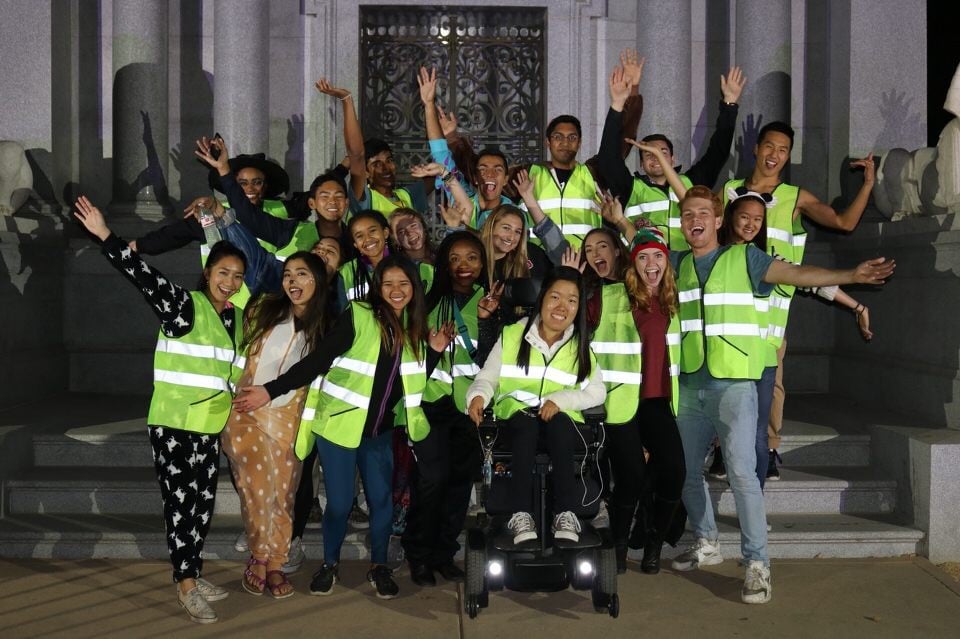This article is the first in a series examining the progress made by Associated Students of Stanford University (ASSU) elected officials, who are now halfway through their terms.
From Full Moon on the Quad to Frosh Formal to Senior Nights, the presidents of every class aim to create events that not only engage students, but also help students feel more included in the Stanford community.
A quarter into each of their terms, The Daily spoke with members of each year’s class president slates to examine the goals they set out for the 2018-2019 academic year.
Frosh council
Frosh Council (FC) president Dwight Moore ’22 ran on a platform of unification and inclusivity.
“I kind of just made a promise to make sure everybody is unified, to make sure everybody can stay on track,” Moore said.
According to its website, FC is the University’s freshman leadership body, which organizes quarterly programming “to unite the first-year class.” FC is comprised of representatives from every residence housing freshmen on campus.
Moore said it was important for the Council to run four main events — including Frosh Formal, FC’s flagship event — to help freshmen meet and connect with other frosh.
Sophomore presidents
Sophomore class presidents Johnathan Bridges ’21, N’Naserri Carew-Johnson ’21, Brian Chan ’21 and Celine Foster ’21, along with the sophomore cabinet, have also hosted social events such as the annual Mausoleum party to connect students.
In an email to The Daily, however, Chan emphasized mental health awareness and sexual assault prevention programming as the cornerstone of the slate’s platform.
The cabinet has organized two committees focused on mental health health, wellness and safety at Stanford. These committees have worked with with Counseling and Psychological Services (CAPS) and Sexual Assault & Relationship Abuse Education & Response (SARA) Office on mental health programming. They hosted a “Kickback with CAPS” event — an open discussion with a CAPS counselor on CAPS resources — and are currently planning sexual assault prevention workshops.
“Our campaign focused on producing fun social events as well as emphasizing programming that addresses mental health and wellness,” Chan wrote. “We’re currently helping to coordinate Sexual Assault Awareness Month, and are laying the foundation to bring more sexual assault prevention events during winter and spring quarter.”
Junior presidents
The junior class presidents — Izzy Angus ’20, Will Kenney ’20, Leila Mengesha ’20, Sofia Dudas ’20 and Marco Lee ’20 — hope to create events with a “low barrier to entry” so that students who are both introverts and “social butterflies” can find a space to meet other members of their class and catch up with old friends, Dudas told The Daily.
This is especially difficult in junior year, according to Kenney, who described junior year as a time when friends are scattered all over campus. Pile on a bunch of new classes and internship applications, and it seems nearly impossible to meet up with friends from frosh year, Kenney believes.
“I think that the focus of our events this year is to bring people together despite that scattered-ness,” he said.
According to Mengesha, these events are geared toward people with “different energy levels and with a variety of hectic schedules.”
Fall quarter, the junior class presidents hosted a series of events related to the arts: Pies and Pints of Ice Cream; Arts and Cafe Night at CoHo; Finals and Vinyls; and Pancakes and Postcards. Another event, “Party at the Post Office,” encouraged juniors to send letters to their family or fellow juniors who are studying abroad.
Senior presidents
Senior Formal, a Stanford senior class tradition, is a top priority for senior class president Tony Moller ’19, who was elected unopposed along with Tashrima Hossain ’19, Aron Tesfai ’19 and Nick Pena ’19. He believes he must not only maintain events that celebrate Stanford tradition but also create new events to help seniors decompress and enjoy their last year at Stanford.
“One of the things we’re really pushing for this year for Senior Formal is financial accessibility,” Moller said. “In previous years we’ve received concerns about tickets being too damn expensive. This year we’re trying to push that down by planning things early, making sure we’re trying to cut costs as much we can.”
Beyond scheduling a packed calendar for seniors, Moller and the senior council also strive to plan a diverse range of events accessible to students of all socioeconomic backgrounds. For those who do not like participating in Senior Nights — events in which the senior class council reserves a bar or club for the class of 2019 — the council created Meet ’19, an initiative that offers gift cards to randomly paired seniors to get coffee together.
There are about 1,600 people in the senior class, Moller said, and “one of the big regrets we’ve heard from [alumni] is that they didn’t branch out their senior year.”
“People get really entrenched with their residential communities or the clubs that they’re in,” he added. “[Meet ’19 is] sort of [to] force people out of their little Stanford social ruts.”
Sonja Hansen, Ryan Long, Melissa Lucio and Udani Satarasinghe contributed reporting.
Contact Aparna Verma at averma2 ‘at’ stanford.edu.
